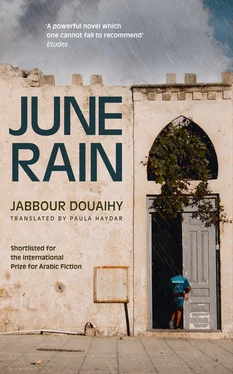She was worried about the Sunday plans she had promised us, and she was worried about the plans the men had in mind.
My father appeared with all his gear: straight razor in his hand, towel on his shoulder and half of his face covered with shaving cream. He was wearing only his white undershirt, the ‘cotton shirt’, as we used to call it.
‘Who’s there?’
‘Us.’
Two voices. Two men.
He recognised them. He looked at my mother.
Our relatives never forgave my mother for being a stranger, never got over her accent or her cooking or her insistence on red lipstick and being fashionable. She was married after all, so what did she need red lipstick for? Nor did they forgive her for always keeping the door shut. As if she was shutting it in their faces.
The two men were also dressed in Sunday clothes, as best they could. That is, the stocky one with the thin moustache, whom we knew and whose name was Ayyoub, was wearing a grey suit that time had left its mark upon, and sweat stains blotched his unbuttoned white shirt, even though it was still early in the morning.
The other one was tall. He was wearing a tie and an American hat tipped to the side. He had a cigarette between his lips and a wart on his left cheek. We were seeing him for the first time as he peered inside our house in a strange manner. Later on we would find out that his name was Farid Badwi al-Semaani.
‘Get dressed. We’re going to the funeral, Moussa,’ the fat one said.
‘What’s going on?’
‘A funeral.’
‘Whose funeral?’
‘…’
‘…’
It was the first time we had ever heard of Burj al-Hawa.
‘Is that village far away, Mother?’
‘Yes. It’s far and the road to it is difficult.’
Worried and embarrassed, my mother stopped putting on her make-up. She listened carefully to what the two men were saying.
‘Is it further than Al-Mazraa?’
‘Yes. Further than Al-Mazraa.’
Al-Mazraa was my mother’s village.
We could see it from our house, there at the foot of the mountain opposite us, that fiery mountain that was said to have been a volcano at one time. My mother’s village was just a cluster of trees and houses, more like a small oasis people had built with patience and care in the middle of that barren mountain. The day my father bought us the binoculars, the first thing we aimed them at was Al-Mazraa. Suddenly and by mere coincidence, my grandfather and my uncle appeared before us picking apricots from the Umm Hsayn apricot tree. They had white cloths on their heads tied at the corners, to protect them from the sun.
The conversation at the door was in whispers.
‘…’
‘…’
‘The Bey is going,’ Ayyoub said definitively, leaving no room for argument.
The one with the tipped hat looked inside the house. Actually, he had been looking more at our clothes and our furniture than at us, while his friend tried to persuade my father.
Ayyoub, the gregarious one, and his silent friend.
My father didn’t invite them in. He stayed at the door speaking to them, his face covered with shaving cream, the straight razor in his hand, his shoulders covered with thick black hair. The stocky one talked about the upcoming elections, how the campaign was serious and how they had to assert their presence, which he said with a wave of his right hand. He stopped talking, waiting for my father to respond, as if he had just recently learned the term ‘presence’ or had heard it from someone he considered knowledgeable and was trying to test out its impact every time he had a chance to speak.
Ayyoub spoke at great length, elaborating and preaching about the necessity of safeguarding our ‘essence’ and being wary of ‘them’. He had proof they were backstabbers. He also had a predilection for using classical Arabic expressions, which my mother had learned to decipher. That was why the more he spoke, the more my mother frowned. She knew my father and his cousins well, and if she kept quiet they would take him with them and if she interfered she would embarrass him in front of them.
As he listened, my father used the towel in his hand to wipe the shaving cream off his face a little bit at a time. That was his way of drawing out the pleasure of his shave, and it would also give him time to think.
Suddenly Ayyoub stopped talking, as if he had exhausted all his arguments and his entire dictionary. He waited for my father’s answer, but it didn’t come. Silence hung in the air. We felt my father’s silence to be a sign he would choose us over the two men.
It was now the man with the tipped hat’s turn. ‘If you don’t want to come with us, give us the car. There are many young men but very few cars…’
‘No!’ the four of us shouted in unison from inside the house without even looking at each other.
Our father quietened us down without responding to them. It was another meaningful silence that wasn’t difficult for the men to understand, and so they turned around and walked away.
My father shut the door, still holding the open straight blade in his right hand. He wasn’t himself. We surrounded him, the four of us, and showered him with kisses. Giving kisses on all sorts of occasions was one of my mother’s innovations, just as the girls’ baths every two days and the boys’ twice a week were also imported by her. Our father tried to escape our attack on him.
‘No, no. Get away. I still have shaving cream on my chin.’
He wouldn’t be kissing us then and not in the days and months that followed, either.
‘Get away from your father!’
My mother understood he was under a lot of pressure and kissing us meant confirmation he was abandoning his relatives.
He went back to the mirror in the bathroom to finish shaving. From the living room we heard him whistling intermittently just as he did while driving the Chevrolet around dangerous bends in the road. This whistling was his way of unburdening himself.
‘Hamid!’
We trembled a little. It was the voice of the eloquent stocky man again. They had both come back to the door. They weren’t going to let my father off easily. My mother made the sign of the cross and we all went back to our battle positions.
‘Yes?’ my father said in a dry tone as he opened the door for them. This time his face was clean-shaven and his shirt was buttoned all the way up to his neck.
The two men stammered. Each was nudging the other to speak first.
‘You say it.’
‘No. You say it.’
My father raised his voice. ‘What’s going on? Speak!’
My father rarely raised his voice. Getting angry exhausted him. If ever he shouted at us, he was quick to make it up to us with a joke or a kiss or some money.
The man with the tipped hat took the initiative. ‘Give us your gun.’
The gun or fard (personal) was the same thing as the musaddas (sixer) or the revolver… you pulled it out and if it was loaded or cocked you shot, either point blank or quick draw, otherwise your adversary would beat you to it and something regrettable would happen. They used bird metaphors and hand metaphors and ‘sparrow’s eye’… You insisted on getting bullets to go with it, bullets that burned and bullets that penetrated…
My father had bought it two or three months earlier from a weapons merchant. He had brought it home, laughing as he told us how after the seller carefully organised the bills my father had paid him and put them in his pocket, satisfied with such a profitable deal.
‘God willing you’ll only use it on live flesh…’ the gun merchant had said to my father wistfully.
My father didn’t tell us why he had bought a revolver he wasn’t going to use. Most probably the time had come when he could no longer say to his family and cousins that he didn’t own a weapon.
Читать дальше












